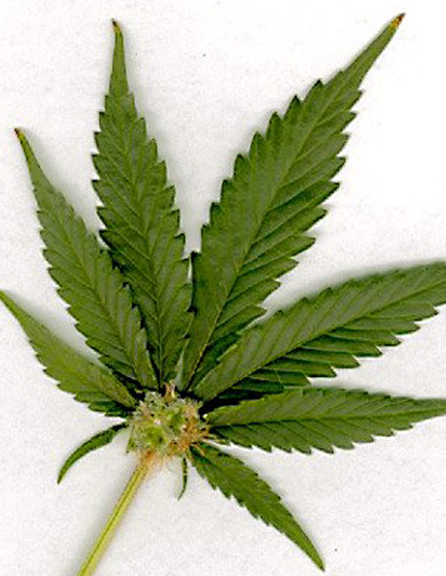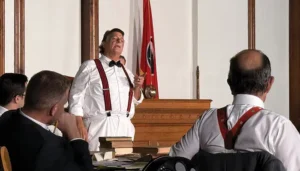
NASHVILLE (BP) — Results of marijuana votes Tuesday (Nov. 4) were mixed, with Oregon, Alaska and the District of Columbia approving recreational pot use but Florida rejecting a state constitutional amendment to legalize medical marijuana.
Two Maine cities made opposite decisions in their votes on recreational marijuana. South Portland approved recreational use by a 52-48 margin while Lewiston rejected it 55-45.
 Marijuana remains illegal under federal law and is classified by the government as a schedule 1 substance, which denotes “drugs with no currently accepted medical use and a high potential for abuse,” according to the U.S. Drug Enforcement Administration website.
Marijuana remains illegal under federal law and is classified by the government as a schedule 1 substance, which denotes “drugs with no currently accepted medical use and a high potential for abuse,” according to the U.S. Drug Enforcement Administration website.
Barrett Duke, vice president for public policy and research at Southern Baptists’ Ethics & Religious Liberty Commission, said in written commentary provided to Baptist Press that the various marijuana votes illustrate advocates’ game plan for making recreational pot legal on a “widespread” basis.
“Marijuana supporters continue to succeed with their plan to legalize this dangerous drug across the country. Their strategy is now quite obvious. They begin by playing on the public’s compassion with medical marijuana, and then follow up with their true agenda: the widespread legalization of recreational marijuana,” Duke said.
“A quick look at the 2014 vote results reveals this strategy very clearly. Oregon and Alaska, which both legalized recreational marijuana on Tuesday, have had legal medical marijuana since 1998. The medical marijuana efforts passed in those states because voters were told it would help relieve peoples’ suffering. Fast forward to 2014, and they now have legal recreational marijuana,” he said.
Duke added, “While many states are falling for the lie of marijuana’s harmlessness, the church does not have to be taken in.”
Oregon and Alaska join Washington and Colorado as the four U.S. states to legalize recreational marijuana. Twenty-three states have legalized medical marijuana.
Oregon
By a 54-46 majority Oregon voters approved Measure 91, which allows adults 21 and over to possess up to eight ounces of dried marijuana and four plants.
Oregon’s marijuana policy will establish a commercial regulatory system for production, distribution and sale of pot, CNN reported.
Mandy Puckett, director of the No on 91 campaign, told BP that the close margin in Oregon’s election was an “amazing accomplishment” since marijuana opponents “were outspent by millions from out of state billionaires who had an interest in marijuana legalization and drug legalization.”
Oregonians “are really torn on this issue and … education about marijuana is significantly lacking,” Puckett said.
Alaska
Alaska voters approved by a 52-48 margin Ballot Measure 2, allowing people 21 and older to possess up to one ounce of marijuana and six plants. The measure also legalizes the manufacture, sale and possession of marijuana paraphernalia.
Measure 2 will become law 90 days after the election is certified, which is expected to occur in late November. The state can then create a marijuana control board, which will have nine months to draft regulations for marijuana businesses, the Alaska Dispatch News reported.
Erick Cordero, campaign manager of the group “Big Marijuana. Big Mistake. Vote No on 2,” told BP his organization will keep a “close watch” on the regulation process to “make sure that our concerns are addressed, especially when it comes to youth getting access to marijuana.” He wants to prevent cookies, brownies and other edibles laced with marijuana from being presented in a way that is “appealing to children.”
Marijuana opponents were outspent 6 to 1 in Alaska, Cordero said, noting that Vote No on 2 was 100 percent funded by Alaskans while the pro-marijuana campaign was 98 percent funded by out-of-state money.
“I’m very proud of our volunteers,” Cordero said. “We were only two staff members and hundreds of volunteers throughout the state. They worked very, very hard.”
Washington, D.C.
Washington, D.C.’s Initiative 71 — which passed by a 65-28 margin — allows residents and visitors 21 and older to possess up to two ounces of marijuana and grow up to three marijuana plants at home, the Washington Post reported.
Because the District of Columbia is controlled by the federal government, the measure will become law unless Congress vetoes it and President Obama agrees, the Post reported. At least one member of Congress has said he will work to block marijuana legalization in D.C.
Washington’s marijuana vote “will result in higher drug use among teens,” Andy Harris, R-Md., said in a written statement to the Post. “I will consider using all resources available to a member of Congress to stop this action, so that drug use among teens does not increase.”
Florida
Florida’s Amendment 2, which would have legalized medical marijuana, received 58 percent support but fell short of the 60 percent threshold needed to approve a state constitutional amendment.
“We are very happy that our quality of life here in Florida is going to be preserved,” Calvina Fay, executive director of the Drug Free America Foundation in St. Petersburg told the Tampa Bay Times. “We are not going to be seeing pot shops everywhere. We are not going to see opportunities for marijuana to be promoted for our children. We are happy the voters in our state took time to actually read the amendment and vote smart.”
Duke congratulated Florida on rejecting medical marijuana, which he dubbed “the Trojan Horse of the marijuana legalization movement.”
“No state has legalized recreational marijuana without first legalizing medical marijuana,” Duke said. “The lesson for all the states is clear: if you legalize medical marijuana, it’s just a short matter of time before you will be contending with the likelihood of legal recreational marijuana. Florida’s voters saved themselves from this fate on Tuesday when they rejected an effort to legalize medical marijuana. Given the clear connection between legalization of medical and recreational marijuana, it’s safe to say that Florida has bought itself more time before it must deal with the question of legalized recreational marijuana.”
Maine
South Portland became the second Maine city to legalize recreational marijuana, following Portland’s vote last year.
In addition to being illegal under federal law, recreational marijuana remains illegal under Maine state law. South Portland police chief Edward Googins told the Portland Press Herald that his officers will continue to enforce state law.
“Obviously, I am disappointed,” Googins said of the vote, “but I understand there has been over the past decade or two some very different beliefs in the use of marijuana. We’ll see how this plays out.”
The York, Maine, Board of Selectmen opted to keep marijuana off Tuesday’s ballot, and a judge backed that decision.















